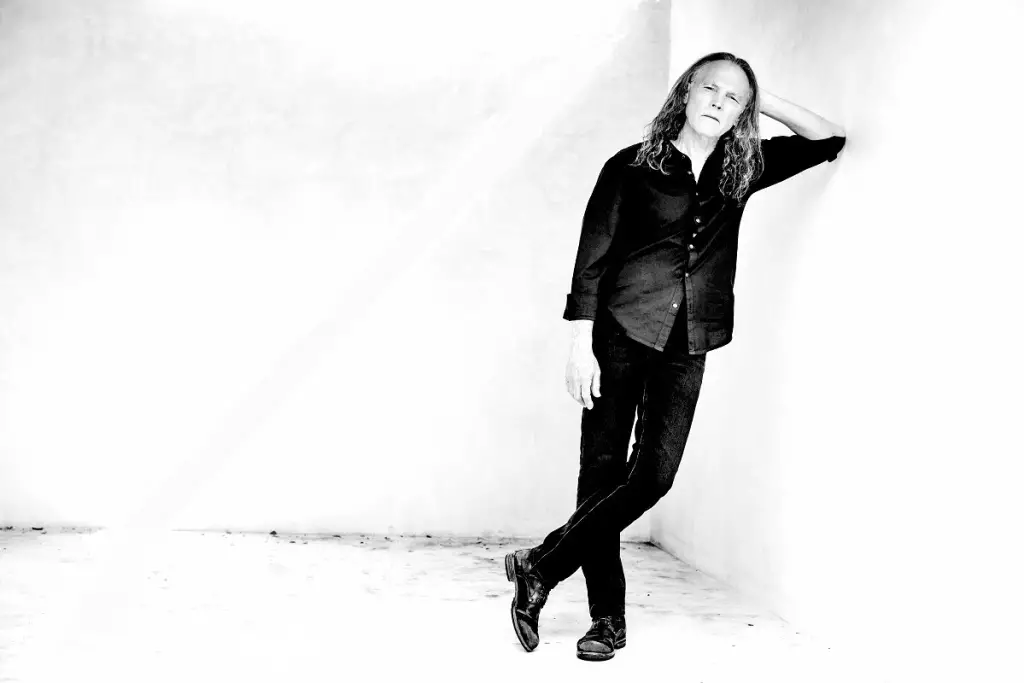All images courtesy of SROPR/Dove Shore

By Andrew Daly
andrew@vinylwriter.com

As a key member of both Poco and The Eagles, Timothy B. Schmit has graced hallowed stages across the globe, and seen himself become an integral cog in both the country-rock and classic rock machines.
These days, when Schmit isn’t handling bass duties for an ever-active Eagles touring unit, he keeps his songwriting chops sharp with his solo work, the latest coming in the form of the full-length LP, Day By Day.
The passage of time has only strengthened the veteran four-stringers songsmith, and with each successive outing, Schmit’s already towering legacy is continually fortified.
I recently dug in with The Eagles’ longtime bassist regarding his latest solo album, Day By Day, the possibility of new music from The Eagles, his evolution as a songwriter, and a whole lot more.
Andrew:
Timothy, thank you for carving out a portion of your afternoon. Let’s talk about Day By Day, what are the origins of the record?
Timothy:
Well, the origins are pretty simple. When I’m not working with The Eagles, and I have some time to myself, I come out to my studio, come up with ideas for songs, and I write them. I might write one, or two or three, and then eventually, I record them, and that’s it. There’s no big concept. I just try to write about whatever I feel like writing about, and sometimes I don’t really know what that is, but eventually, it reveals itself. So, there’s no concept or, or big idea looming with these songs. They are just what I was feeling, and what inspired me, and so I put pen to paper and recorded what came of that.
Andrew:
Do you see this record as directly related to your last solo effort, Leap of Faith?
Timothy:
Well, what I’ll tell you is this: what I do is I try and come up with ideas for songs, and then I pursue them. And if it pans out and becomes a song, I’ll record it. I’ll try and do that as often as possible, and then when I have like six or seven songs, I’ll say to myself, “Maybe it’s time to turn this into another record.” That’s kind of how it is, really. I truly enjoy songwriting, even though it’s painful sometimes. [Laughs]. I mean, it’s not painful like digging a ditch, but it’s painful in other ways. But sometimes – eventually – it becomes very fulfilling. I love the process. I love coming up with a little seed, watching it sprout, and then seeing it come into its own. That’s what I like about what I do. I like writing songs, I like the actual process, and I like the actual movements during songwriting. And when I have a collection of songs, I try and put them together to see if they sound like some sort of coherent record.
Andrew:
The latest single is “I Come Alive.” Break down that track for me.
Timothy:
When I was in Santa Fe, I was exploring one of my other outside interests from music – and there wasn’t really another outside interest until about fifteen years ago – and that’s Native American art and artifacts. So, I was in Santa Fe one summer going to one of these trade shows, and I brought a guitar with me, and I sat down in the place I was staying, started playing, and it just popped into my head. There wasn’t any particular event or anything on my mind that made it come out, it just manifested itself. “I Come Alive” is very simple, and on my part, it came about very easily. So, because it was so free and easy, I decided to keep going with the flow and make the subject matter very positive. You know, sort of not too deep, just like I’m having a great day, and when I see you, I come alive. It’s kind of that simple.

Andrew:
“Simple Man,” and “Heartbeat” represent the other two singles. What makes those tracks significant to you, Timothy?
Timothy:
Well, nothing different from any other song that I come up with. It’s really just something where it comes to me, and I pursue it because I like it. Although, well, now that you mention it, “Heartbeat” is very personal. In fact, the actual heartbeat on that record is my wife’s, I recorded her heartbeat for this song. You know, it’s a sweet and personal song, it’s about having a great life with someone, and making it last. I really related to that concept, because for me, it’s true. I have a really great life, my wife and I are really tight, and we enjoy each other so much, and I just wrote about it. It’s kind of a cool song because it’s sort of in a bit of an R&B mode, which I love to do too.
Now, with “Simple Man,” I was on the island of Hawaii with my guitar, and I just came up with the first couple of words, and instantly thought, “This is pretty cool. It could really be a good song.” So, I eventually finished the song with that in mind, and I treated it that way. It’s not a lead singer with some background vocals, instead, it’s everybody singing every word at all times, all harmonizing. I loved that and I decided to embrace that concept and go with it.
Andrew:
What does your solo work allow that your role with The Eagles perhaps does not?
Timothy:
First and foremost, there are no limitations. I can do whatever I want. I don’t have to run it past anybody. When you’re collaborating, if you’re in a band, or if you’re collaborating as a songwriter, there are a certain amount of things you have to do in terms of compromising with everybody else. With my solo stuff – and I think Don [Henley] and Joe [Walsh] could tell you the same thing – you don’t have to do that, you don’t have to compromise at all. When you’re doing your own thing, you can do literally whatever you want, you know? And that’s the very freeing element. I’m not saying that being in The Eagles is not freeing for me, it’s just different.
Andrew:
Who’s backing you up on this album, Timothy?
Timothy:
A lot of people. [Laughs]. I have at least two or three different drummers. It all comes down to and depends on the vibe of each individual song. I would write the song and get a vocal with just an acoustic guitar, and I would try and figure out what direction it’s going, and then I would try and think of who would be best suited for it. Then I called them up and checked to see if they wanted to do it. Some are well-known people, some are not, but one thing is certain – they’re all really great.

Andrew:
Since joining The Eagles in the late 70s, how would say you’ve progressed as both a musician and songwriter?
Timothy:
Oh, I’ve progressed quite a lot. Like, really a lot. I’ve I believe that I’m actually starting to understand how to write a song. [Laughs]. You know, I was writing songs back then, but I really didn’t grasp the whole picture, which is something I’m still trying to grasp. [Laughs]. I don’t know if I’ve ever grasped the whole picture, but I’m better at it now than ever before, that I do know for sure. As always, I work hard to instill songwriting discipline in myself, while still enjoying it, with the intention of coming up with something decent. Over time, I’ve just become better, probably because I’m older, more seasoned, and I’ve lived longer.
Andrew:
What’s the most challenging part of songwriting for you now?
Timothy:
Well, this fellow songwriter friend of mine used to say, “There are two parts of songwriting: when you come up with the first initial idea, and the second one, which is usually the better one, and when you finish it.” As a songwriter, those are really the highlights. The rest in between is usually a lot of concentration, hard work, and trying to figure out the puzzle.
Andrew:
Of course, you are with The Eagles. To that end, it’s been quite a while since The Eagles have put out a new record. Being that you are a better songwriter now than you’ve ever been, and The Eagles still actively touring, is there any chance we’ll see new Eagles music on the horizon as well?
Timothy:
Well, you never know with his band, but my inclination today is probably not. You know, the people who come to our concerts, they know our history, they know the old songs, and honestly, that’s what they want to hear. We had put out an album in 2007 and put a bunch of the new songs in the set, and we don’t do any of them anymore, and there’s a reason for that – fans are not as interested in that newer stuff. They are into what they’ve heard for years, or what their parents were listening to. That said, what’s very cool is there are a lot of younger people coming to shows now too.

Andrew:
For you as an artist, and as a member of a band like The Eagles, which has such great capabilities, is it frustrating at all to feel as if it’s not worthwhile to create new music?
Timothy:
I can’t get answered for Joe or Don, but you know, people are still really coming out to see us. Almost every show is sold out, which is pretty mind-blowing that it’s still going that way. So, while new music is always great, I have my outlet with my solo work, and I think we’re all good with what’s going on.
Andrew:
There is one Eagles track which from Long Road Out of Eden that I really like called “Do Something.” You had a major hand in writing that track, can you recount its inception for us?
Timothy:
You know, I don’t get asked about that one too much! As I recall, we were in the studio still recording part of that last album, but we still needed other songs. So, one day I picked up a guitar in one of the rooms and started playing and sort of humming a melody. While I was doing that, Don came by and said, “What’s that?” I said it’s, “Oh, I don’t know? It’s just something I’m goofing around with.” And he says, “I like it. Remember that one for later.” So, that was the seed, and then the rest was collaboration both together, or on our own, meaning we were either together throwing out ideas, or we’d come in after having an idea by ourselves, and put it together then. That’s how that one happened.
Andrew:
Of course, you’ve got some upcoming dates with The Eagles, but as far as your solo material, will it be getting some time on the live circuit?
Timothy:
I’m still waiting. As we speak, I’m waiting to hear if there’s any more action after The Eagles go to Europe in June. After June is what I need to find out about, and if there’s any more action. Right now, it’s kind of up in the air, but I should know pretty soon if we are done. If we are coming off the road, I’m going to probably try and do some shows. We shall see.
Andrew:
What’s next for you in all lanes, Timothy?
Timothy:
Well, I just hope to stay healthy and as vibrant as possible, so I can come up with some new art. Really, that’s what I want to do and to try and live in the present as much as possible. Basically, I want to enjoy my life while I have my life. I think that’s all that any of us can ask for.

Interested in learning more about Timothy B. Schmit? Hit the link below:
Be sure to check out the full catalog of VWMusic Interviews, by Andrew Daly, here: www.vinylwritermusic.com/interviews





Leave a Reply